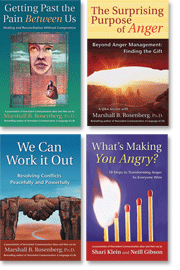Enjoyable Family Gatherings, continued
It's your choice. Here are five tips for making your next family gathering the experience you've always wanted.
We call this creating an intention. If you aren't very clear about what you do want to experience, then it will be difficult to make that happen. And it may be hard for you to even notice it when it is happening. How do you get clear about your intention? Ask yourself these questions:
"What qualities would I like to experience?"
You might choose fun, caring and harmony. Or peacefulness: "If my experience today could only be peaceful I would walk out happy and wanting to return next time." Take some time to imagine all the qualities that would make your next family gathering a wonderful experience for you.
"How could my family and I benefit from this?"
Perhaps your family:
- Could experience a greater sense of connection
- Might look forward to seeing each other again
- Would be more playful with one another
- Or ... ?
The time you spend identifying these benefits will help you remember your intention if things get challenging at the gathering.
You might ask, "When Aunt Sue complains about everything under the sun, is she doing the best she can? When Dad criticizes me about every part of my life, is he doing the best he can?"
Yes. They're doing the best they can.
Stop and think about it. Do they look like they are having fun? Are they being effective at getting what they really want? If they knew a way to take care of themselves that they enjoyed more and that worked better, don't you think they would do it? So if you get upset seeing people act the way they do, remind yourself: They're doing the best they can. Then get back to creating what you want to experience as fast as you can.
"Don't take it personally if someone tells me that what I'm doing is stupid?"
You can do this if you start with this understanding: Everything people do or say starts with a desire to support something they value. And what would that be? Guess.
Your father says to you, "How can you possibly think starting your own business is a smart thing to do?" He might value security, or predictability. He might be worried about how you'll continue to pay your bills. Believe it or not, this might be his attempt to contribute to you. And, he is doing the best he can.
So the next time you hear something you don't enjoy, the next time you want to defend yourself and justify your position, STOP and remember: It's about them. Don't take it personally.
Instead, try to be curious. "Wow, I wonder what's going on with them?" Imagine yourself in the other person's shoes: "If I said or did that, what might be going on with me?" See if you can guess.
One big cause of upset between people is not being sure about what they want from each other.
Have you ever heard people express concerns or complaints like: "I just don't know how I'm going to pay my rent this month"? Or "I hate it when we start eating without giving thanks first." Or maybe a family member starts talking to you about how your favorite cousin is making a mess of her life.
What happens then? Do you feel confused or uncomfortable? Do you want to justify yourself, explain the situation, or give advice?
Whenever you feel uncomfortable hearing people's concerns or complaints, we believe this is partly caused by your not understanding what they want from you.
We suggest you start asking for clarity. Say or guess out loud what you think the other person might want from you.
Before you start, remember tips 1, 2, and 3.
- Get present to the intention you created for the gathering.
- Remember people are doing the best they can.
- Don't take things personally.
Suppose cousin Jim says, "I just don't know how I'm going to pay my rent this month." What does he want? Ask him, "Do you want to brainstorm some ideas about how you might get your rent this month?"
Or when your grandmother says, "I hate it when we start eating without giving thanks first." What does she want? Ask her, "Would you like to see if somebody is willing to give thanks before we eat this year?
If your guesses aren't accurate, they'll let you know by saying something that gets closer to what they do want. Your guess will open the way for a conversation that can lead to more understanding and less stress for both of you.
What you focus your attention on grows.
If you constantly notice things that cause you pain, then you will continue to suffer. "How inconsiderate he is." "She doesn't care about me." "He's the most selfish person I've ever known."
Try focusing your attention on what you enjoy.
It may sound simple. But ask yourself, "What would it be like if I spent my day simply noticing everything that I enjoy about being with my family?"
Imagine looking for all the things that you do enjoy, and being thankful for them. "It smells so good in here; I can't wait to eat." "I'm so grateful that everyone cares enough to spend time together." "It's nice that my mom enjoys having these gatherings at her house."
How would you feel if you focused your attention on these things?
So, decide what you really do want to experience, know that people are doing the best they can, don't take things personally, clarify your understanding about what others want, and focus on what you enjoy -- Do this and experience the fastest, easiest way to enjoy any family gathering.
If you're ready to improve all your relationships, sign up for our thought-provoking and motivational Weekly Action Tips eMail series. Each tip offers unique self-help skills and personal growth techniques that help you stay focused on what's most important to you. Sign up today!
And for other great relationship tips, visit our blog: www.NewAgeSelfHelp.com
Remember, the shortest path to a happy life is found through conscious choice.
Neill Gibson is co-author of the PuddleDancer Press booklet What's Making You Angry? He and Beth Banning are the founders of Focused Attention, Inc. They would love to help you learn new communication, relationship, and personal growth skills that will support you in having more fun in your life, and inspire a more conscious, loving and peaceful world.
Keep learning these vital communication skills with these books and training resources:




